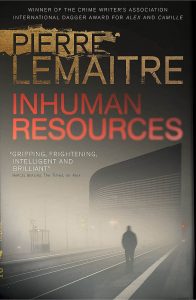Published by Macmillan UK/Minotaur US
The Rival by Charlotte Duckworth
Published by Quercus
What Was Lost by Jean Levy
Published by Dome Press
Inhuman Resources by Pierre Lemaitre
Published by Maclehose
Lethal White by Robert Galbraith
Published by Sphere UK/Mulholland US
Crime fiction allows writers to explore real and painful aspects of life at the same time as providing pacy and entertaining stories. It also gives them the chance to break taboos. This month’s novels all deal with serious issues of mental health. In the old days sufferers and their families kept quiet about even such common illnesses as depression, as though there were something shameful about them. More recently the taboo has been about any mention of the emotional cost paid by the families and friends of the mentally ill. It is good to see crime writers crashing through this barrier.
Ann Cleeves writes in her latest Shetland novel – Wild Fire – about Helena and her husband, Daniel: ‘His depression came in waves and, like the sea, sometimes swamped him, washed away the man she knew and loved, leaving her with a bitter and angry stranger. It would be good to be in the house without him for a while.’ Later she asks herself, ‘How could he just ignore her, when she did so much to make his life easy? To protect him?’
 Charlotte Duckworth’s first-person narrator, also Helena, is struggling to recover from the death of her first baby in The Rival, which is split between ‘Then’, before her pregnancy, and ‘Now’ after the unexplained disaster. During an anniversary dinner with her husband she thinks, ‘The old me would have railed against such behaviour, told him that I was well aware what a tasting menu was thank you very much, but I’ve grown used to letting Jack make decisions for me. The inevitable side effect of not being able to trust your own choices any more. It’s so much easier when someone else can take the blame.’ What Helena is enduring is terrible but that casual comment about the benefit of having someone else to blame makes it as clear as the other Helena’s longing to have the house to herself, quite how hard it is to look after a mentally ill spouse.
Charlotte Duckworth’s first-person narrator, also Helena, is struggling to recover from the death of her first baby in The Rival, which is split between ‘Then’, before her pregnancy, and ‘Now’ after the unexplained disaster. During an anniversary dinner with her husband she thinks, ‘The old me would have railed against such behaviour, told him that I was well aware what a tasting menu was thank you very much, but I’ve grown used to letting Jack make decisions for me. The inevitable side effect of not being able to trust your own choices any more. It’s so much easier when someone else can take the blame.’ What Helena is enduring is terrible but that casual comment about the benefit of having someone else to blame makes it as clear as the other Helena’s longing to have the house to herself, quite how hard it is to look after a mentally ill spouse.
These novels are, of course, about a great deal more than that, but it provides the subtext for both. Wild Fire deals with suicide and murder, and with children trying to make sense of a world in which the adults who should be caring for them are either violently abusive or so absorbed in their own selfish preoccupations that they have no idea what their children suffer – or why.
The police investigation into the death by hanging of a young woman is carried out by Jimmy Perez and his sometime lover, DCI Willow Reeves, along with Sandy. They are among Cleeves’s best characters and Jimmy’s relationship with his stepdaughter, Cassie, is both realistic and touching. Cleeves has said that Wild Fire will be the last of her Shetland novels, which is a great pity. I hope she will take the many excellent aspects of this series to some other island somewhere else and build up new fictional relationships there.
The rival of Charlotte Duckworth’s title is 25-year-old Ashley Thompson, who works in the same company as Helena in the ‘Then’ sections of the novel. Ashley has a violent family history and absolutely burning ambition to succeed at work, just as Helena has, and the tension in the novel comes almost as much from which of the women will ultimately succeed as what precisely happened to Helena’s baby and whether or not she will recover with the treatment she is about to undergo.
A lot of the issues laid out in this novel are important, including the heritability of mental illness. Among the questions raised are: how do women deal with the physical and emotional load of child-bearing and -rearing without breaking? How do they combine paid work and motherhood? If they can’t, how do they retain their links to the outside world and their autonomy and feelings of self-worth while locked in by domestic life? As I read this novel, it was sometimes hard to balance the seriousness of these question with the triviality of the two women’s work, which is devoted to a cosmetics-selling website, but for them it’s a matter of life and death.
Duckworth’s Helena’s memory is affected by her illness, as is that of Jean Levy’s Sarah, who is living in a bleakly empty flat without friends, family, or any memories at all. She is regularly visited by an irritating social worker and a neighbour’s black-and-white cat. She tries to make sense of her life and self, writing notes,  shopping for food for herself and the cat. Although she can remember nothing, she knows how to drive and how to shop. Gradually as the novel progresses, she finds facts to fill out the vast void and learns, as the reader does, about the deaths that have caused this dissociative state. This is an intelligent novel, which eschews easy answers and deals not only with issues as important as any in the other two, but also with the competition between psychiatrists of different persuasions, between siblings, between mothers and daughters, and between victims and their tormentors. The ultimate twist is effective and convincing.
shopping for food for herself and the cat. Although she can remember nothing, she knows how to drive and how to shop. Gradually as the novel progresses, she finds facts to fill out the vast void and learns, as the reader does, about the deaths that have caused this dissociative state. This is an intelligent novel, which eschews easy answers and deals not only with issues as important as any in the other two, but also with the competition between psychiatrists of different persuasions, between siblings, between mothers and daughters, and between victims and their tormentors. The ultimate twist is effective and convincing.
Pierre Lemaitre’s narrator, Alain Delambres, explains to the reader that nothing is harder than to live with a depressed person except to be that person. He has every reason to be depressed, having lost his job in HR and now struggling to earn enough from the most menial jobs while searching for something better. He is in his late fifties, married to the beautiful Nicole, who puts up with an enormous amount, and father of two adult daughters. When a job opportunity arises, he is determined to do absolutely anything to get it, even though the headhunters have designed a bizarre selection process that involves the applicants and the company’s executives in a convincing hostage plot.
Alain’s determination makes him behave with the most atrocious selfishness towards his long-suffering family, but it provides a clever and highly entertaining narrative. Lemaitre, who won the Prix Goncourt for The Great  Swindle, does not repeat himself or conform to any kind of fashion and his novels are all the more welcome for that.
Swindle, does not repeat himself or conform to any kind of fashion and his novels are all the more welcome for that.
The mentally ill man who triggers part of the plot in Robert Galbraith’s Lethal White is presented much more traditionally as the only victim of his illness. This is a long (649pp) novel about the blackmail of a government minister in the run-up to the London Olympics. There is also a death, which could be either suicide or murder. The novel displays all the storytelling skill Robert Galbraith (aka J. K. Rowling) has used to entrance generations of readers.
She plays on many deep-seated prejudices. The government minister is head of a family of landed toffs, most of whom are presented as greedy, cruel, thoughtless, and ignorant of the needs of anyone outside their charmed circle. This allows her to indulge her readers with accounts of the high life in expensive restaurants, clubs and parties while mocking those who are most at home there. At the same time a hard-left, rent-a-mob type of activist, turns out to be a hypocritical, drug-taking, criminal lout. Among the men who work in the House of Commons is a heavy-breathing, bottom-pinching figure all too familiar from the #metoo movement.
The two appealing characters, sleuths Cormoran Strike and Robin Ellacott, could stand for male and female archetypes. He was maimed in war as traditional men always have been, whereas her trauma is the result of rape, far from any battlefield. She is as charming as she is beautiful and so compliant that she not only goes through with a wedding she dreads but also blames herself for many of the disasters that befall her. Strike is the opposite of compliant, irritated by those who do not provide exactly what he wants when he wants it and in the form he wants it. He is happy to accept good home-cooking, comfort and shagging from another beautiful woman only so long as she refrains from bothering him with any of her own emotional needs. Robin would put herself through any number of painful hoops to avoid doing that and will always provide him with, for example, tea precisely as he likes it. Robin is brave and resourceful, but it is Strike who works out what has been going on in the crimes they’re investigating, and even when he lays out the clues for her and the reader she is flatteringly puzzled.
‘Galbraith’ is not an elegant writer. One characteristic sentence reads: ‘Lorelei had cooked, and was looking particularly lovely in a silky sapphire blue dress that resembled nightwear…’ but knows exactly how to pace the story. She efficiently withholds the reason for the blackmail until near the end of the novel, but when it comes it is unconvincing, not only in the business model behind the minister’s activities but also in the difficulty Strike has had in uncovering them. In a world as full of spite and gossip as the House of Commons, plenty of people would have been all too aware of what he was doing and few would have kept the secret. Such quibbles will not, of course, worry any of Galbraith’s legions of fans.

